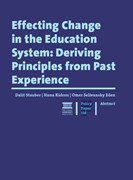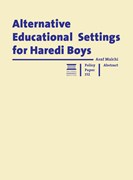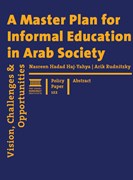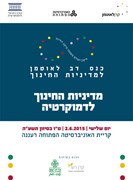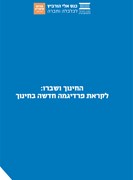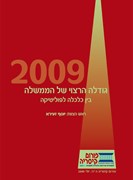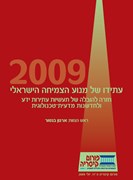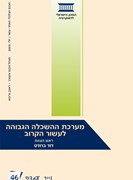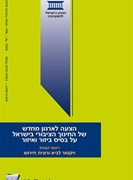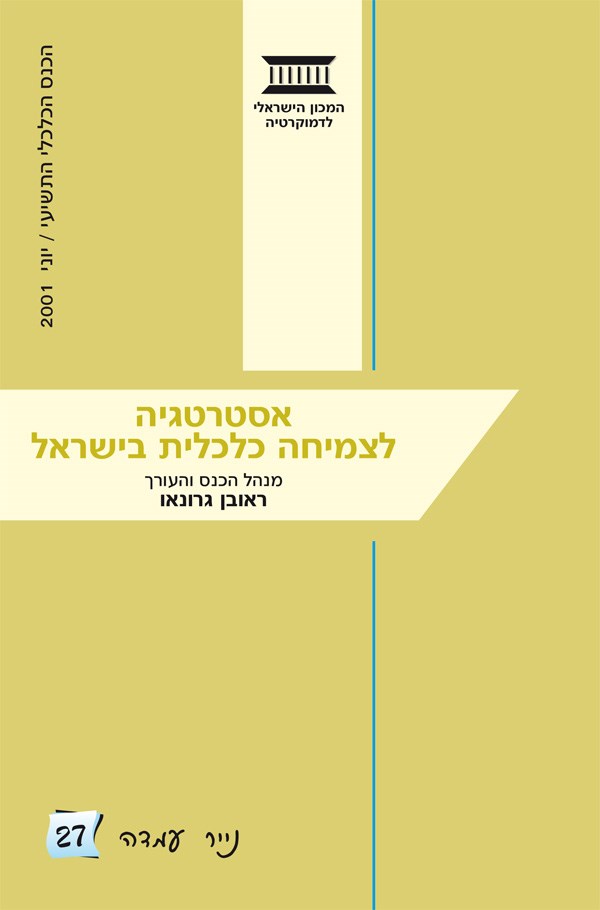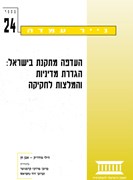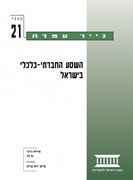

Publications Regarding Education
Articles

Israel's Education System Has Lost its Compass
Written By: Dr. Tammy Hoffman
The education system is obligated to create, for all students in Israeli society, a common foundation for life in a Jewish and democratic state. This includes the ability of students to engage in difficult discussions and requires educators who are grounded in civic responsibility and democratic values.

(Non-)Enforcement of the Core Curriculum Requirement in ultra-Orthodox Boys’ Education
Written By: Dr. Ariel Finkelstein
Despite clear indications that a significant number of ultra-Orthodox boys’ schools do not teach core subjects as required by law, hardly any face penalties from the Ministry of Education. The few penalties that are imposed are minor.

The Iran War and Lessons for Israel's Education System
Written By: Dr. Shlomit Shahino Kesler
As the school system shuttered yet again in the war with Iran, Israeli society debates everything from safety to solidarity, but leaves out a critical virtue: the education of our children. Israel's ultra-Orthodox society, in spite of its refusal to be part of the Israeli collective experience, puts education at the core of its value system – what can the rest of the Israeli public learn from them?

Budget Allocation to the Ultra-Orthodox Education System Under 2025 Coalition Agreements
Written By: Ronny Barboy, Dr. Neri Horowitz
A "nuts and bolts" review of the coalition agreement related to Haredi education in the 2025 State budget.

Fake or Not Project for Media Literacy: Knowledge, Tools, and Skills for Educators in Educational and Social Spaces.
Written By: Education Policy Program
The "Fake or Not" initiative emerged after the outbreak of the "Iron Swords" war, from an understanding of the need to emphasize media literacy in educational and social institutions.

The 2024-2025 School Year Opens Amidst the War
Written By: Dr. Tammy Hoffman, Meital Baron
The education system is one of the primary arenas for addressing the challenges of tomorrow. Given that Israel's education system has children from different backgrounds going to different schools, addressing these challenges is particularly difficult.

October 7 and 9/11, As Taught In Classrooms
Written By: Dr. Tammy Hoffman
The connection between October 7th and September 11th are not just in the magnitude of the tragedy and their ongoing global impact, but in the messaging and paradigms introduced into the educational system, as it attempts to tackle this fateful event. The education system has a critical role to play in allowing society to deal constructively with the consequences of the current war.

Education and Democracy
Written By: Dr. Tammy Hoffman
Dr. Tammy Hoffman, Director of IDI's Education Policy Program explains why the current political and social crisis in Israel is related to the education system and why there cannot be democracy without educating toward democracy.
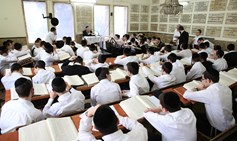
On the Haredi Educational System
Written By: Adv. Shlomit Ravitsky Tur-Paz, Dr. Gilad Malach
This explainer will cover the current structure of the Haredi education system, its pedagogical requirements and the budgets it receives from the Government.
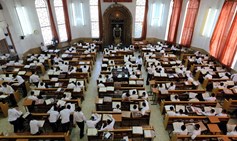
Mass Tracking of Boys to Yeshivas Comes at the Price of Excellence
Written By: Prof. Benjamin Porat, Eliyahu Berkovits
The current model of the yeshiva and kollel world, in which all men are channelled for long years of study serves the goal of keeping young ultra-Orthodox men off the secular street. Paradoxically, the main victim is the Torah world itself.

Can There Be Education without Democracy?
Written By: Dr. Tammy Hoffman
Education can exist without democracy - however democracy cannot exist without education for democracy

English Studies for Ultra-Orthodox Boys - Study
Written By: Dr. Ariel Finkelstein
A new IDI study finds that 26% of ultra-Orthodox men say they don’t know English at all and an additional 28% say their English is "poor."
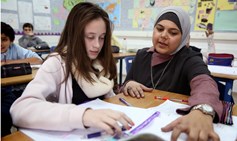
Taking Attendance: Arab Teachers and Students in Israel’s Education System
Written By: Dr. Nasreen Haddad Haj-Yahya
Israel is at a shortage of teachers that is forcing schools to take drastic measures, but the Jewish schools are still not hiring Arab teachers.

We Must not Squander the Opportunity for Real Change in Israeli Schools
Written By: Dr. Tammy Hoffman
How many generations of Israelis will be educated without the tools they need to commit to the values of inclusion, respect for the other, and equality?
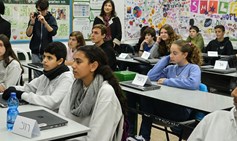
Education. For Democracy. Now.
Written By: Dr. Tammy Hoffman
The education system must cultivate political and civic literacy of today’s pupils and tomorrow’s citizens

What Should we be Studying in Times of Corona?
Written By: Dr. Tammy Hoffman
We should take advantage of the opportunity that the coronavirus presents to improve our children's education.
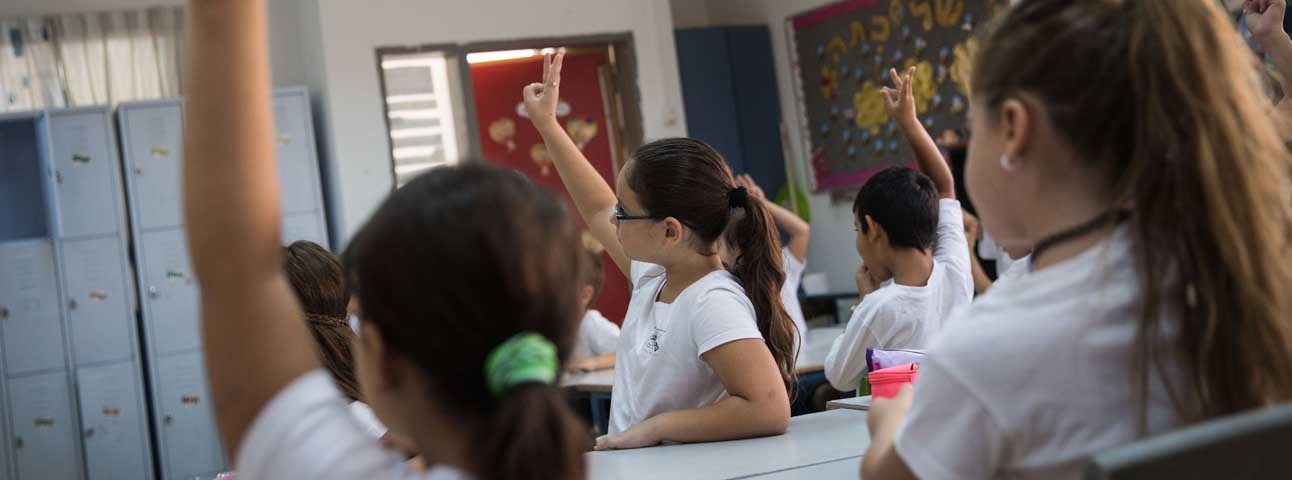
New School Year 2019
The majority of the public would prefer to pay more taxes, in exchange for funding of education from birth for all Israeli children; The respondents defined the main factor impacting the quality of education, is the quality of teaching in schools; Moreover, most Israelis would not encourage their children to work as teachers in the future
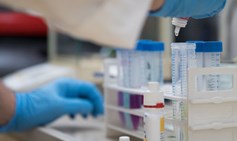
Adapting to the Future Job Market
Written By: Daphna Aviram-Nitzan, Aharon Aharon, By: Alan Rosenbaum
Reframing the eco-system to prepare for Israel’s job market of the future.

Watch the Construction of the Democracy Pavilion in 60 Seconds
Ron Huldai, Mayor of Tel Aviv-Yafo Municipality: "The establishment of the Democracy Pavilion is an impressive demonstration of Israeli democracy. Only in a democratic society can freedom and tolerance co-exist. This is what allows the opposing sectors of Israeli society to live side by side." The Democracy Pavilion is located at the start of the Independence Trail in Tel Aviv and is open to the public free of charge.

The Democracy Pavilion
After months of preparation, we are proud to inaugurate, along with the Tel-Aviv-Yafo Municipality, the Democracy Pavilion, celebrating 70 years of Israel’s independence. A unique multi-media experience, in full 360-degree technology, showcasing the values embedded in Israel’s Declaration of Independence and the historic highlights of 70 years of independence.
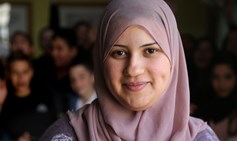
For Arab Women in Israel, It's Just Not Working
Written By: Dr. Nasreen Haddad Haj-Yahya
Arab women - around 10% of the total population of Israel - barely participate in the workforce, far below the employment rate of Arab or even ultra-Orthodox men. Why?
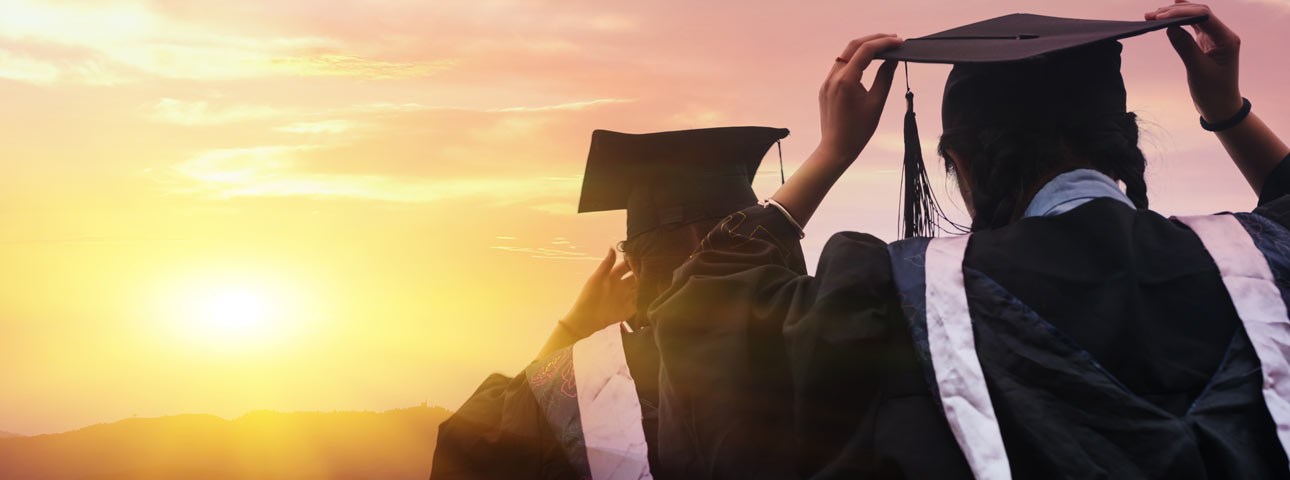
IDI Scholars: 'Gender-Separate Classrooms Could Enable More Ultra-Orthodox Students to Attain Higher Education Degrees'
In the coming weeks, members of the Council of Higher Education will vote on expanding gender-separated classrooms for ultra-Orthodox on academic campuses.
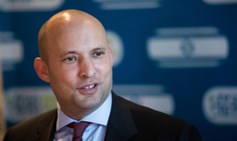
A History Lesson
Written By: Prof. Mordechai Kremnitzer, Admiral (Res.) Amichay (Ami) Ayalon
Experience and history repeatedly teach us that what was once widely accepted as an irrefutable truth can be revealed to be a total falsehood.

Peace Index: 62% of Israelis Predict Clinton Will Win U.S. Election
Sixty-two percent of Israelis expect Democratic candidate Hillary Clinton to win the U.S. election, according to the latest Peace Index, published Wednesday by the Israel Democracy Institute and Tel Aviv University.

Israel's Tragedy: One Country, Separate School Systems
Written By: Dr. Shuki Friedman
IDI's Shuki Friedman laments the existence of separate education systems for each sector of Israel's population, which reinforce, rather than bridge societal divides. This op-ed first appeared on Times of Israel.

Social Networks: The Tools of Tyrants and Democrats Alike
Written By: Dr. Tehilla Shwartz Altshuler
Dr. Tehilla Shwartz Altshuler says rejoicing over the death of television and the birth of “intervision” is premature. This column was originally published by Times of Israel.

IDI on the Bennett-Council for Higher Education Agreement
IDI's Yohanan Plesner: "We need to look at this from a long-term perspective."

The Israel Democracy Institute on Reforming the Council Of Higher Education and the Committee for Planning and Budgeting
IDI to Minister of Education Naftali Bennett: "Form a committee for appointing members of the Council of Higher Education, have the process overseen by the Attorney General and better coordinate with representatives from a variety of fields."
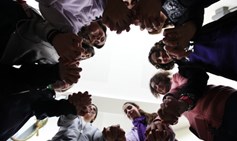
Education for Democratic Values and Combating Racism through Education
Written By: Prof. Mordechai Kremnitzer, Noam Lautman
IDI Vice President Prof. Mordechai Kremnitzer and Noam Lautman, Chairman of the Lautman Fund, recommend ways in which the Israeli educational system can strengthen democratic values, and warn that students should not be forced to choose between two competing alternatives—Israel as a nation-state or as a "state of all its citizens."
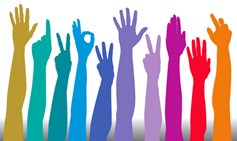
Education for Democracy as a Remedy for Violence
Written By: Dr. Amir Fuchs
Attorney Amir Fuchs asserts that educating Israeli students regarding democracy and civics from a young age and throughout their education is the best way to prevent hatred, violence, and racism.

Holocaust Studies for Preschoolers: Another Missed Educational Opportunity?
Written By: Dr. Arye Carmon
In a <em>Times of Israel</em> op-ed, Dr. Arye Carmon advocates a new approach to educating Israeli school children about the Holocaust, which will humanize both the victims and the perpetrators.
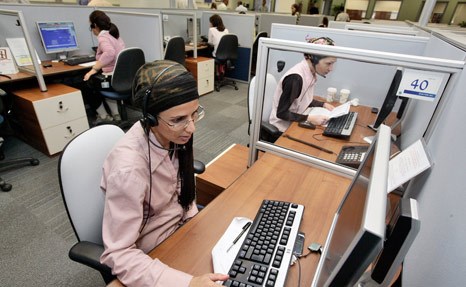
Integrating the Ultra-Orthodox
Written By: Andrew Friedman
To facilitate the entry of haredim into academia and the workforce, the state and private industry have invested hundreds of millions of shekels in recent years to create ultra-Orthodox frameworks to support individuals who are looking for academic education and employment while also remaining loyal to their cultural mores. As a result, nearly 80 percent of ultra-Orthodox women are now employed, on par with secular Jewish Israeli women.
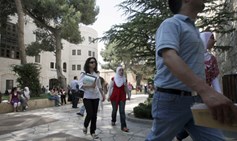
Is Anyone Surprised that Only 11% of Israeli Undergraduate Students are Arab?
Written By: Nabil Khattab
As the academic year started at Israeli universities, <em>Haaretz </em>reported that Israel's Arab population is extremely under-represented in all levels of Israeli higher education. Dr. Nabil Khattab, head of IDI's Arab-Jewish Relations project, shares his thoughts on these findings.
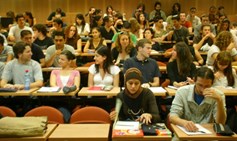
Occupational Mismatch among College-Educated Arabs in Israel
Written By: Sami Miaari, Nabil Khattab, Ola Nabwani
An abstract of an article that examines the extent of the occupational mismatch among college-educated Arabs as compared to the mismatch among college-educated Jews, based on data from surveys conducted from 2000–2010.
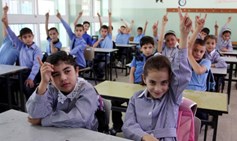
Analysis of Scholastic Achievement Disparities between the Arab and Jewish Sectors: The PISA Tests, 2000 to 2009
Written By: Leah Borovoi, Avital Manor, Nabil Khattab
Research conducted by IDI's Arab-Jewish Relations project reveals a disparity between student achievement in the Jewish and Arab sectors. This abstract points to the variables that explain these disparities.
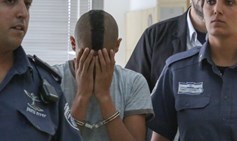
The Fruit of a Poisonous Tree
Written By: Dr. Amir Fuchs
Israeli politicians deemed the attack of a group of Arab teens by a group of Jewish teens to be the act of "bad apples" who don't represent the norm. In the following op-ed, however, IDI researcher Attorney Amir Fuchs warns that the radicalization of Israeli youth is the fruit of a poisonous tree being cultivated in the Knesset itself.

Do Educational Gaps between Elementary School Teachers Have an Impact on Achievement Gaps between Jewish and Arab Schools?
Written By: Nabil Khattab
Are there gaps in the level of formal education required of elementary school teachers in the Arab and Jewish sectors in Israel and the level of education that they actually attain? Dr. Nabil Khattab, head of IDI’s Arab-Jewish Relations project, explores this question as part of an attempt to understand gaps in achievement between Jewish and Arab schools.
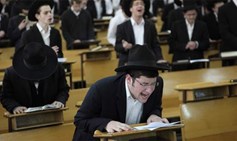
Coercive Imposition of Western Culture
Written By:
In this article from Haaretz published on October 3, 2010, Former Education Minister Rabbi Itshak Levi, head of Policy Implementation at IDI, objects to the cultural coercion involved in a mandatory core curriculum, and advocates requiring only the study of Hebrew and Civics of all students in Israel.

Immigrants and Crime: The Case of FSU Immigrants to Israel
Written By: Michael Philippov
Researcher Michael Philippov exposes stereotypical views of Russian immigrants and suggests that criminality is a product of Israeli society's obtuseness and indifference. He encourages Israel to consider Aliyah absorption seriously and to focus on fundamental problems such as the lack of development of the peripheral regions and insufficient investment in education.
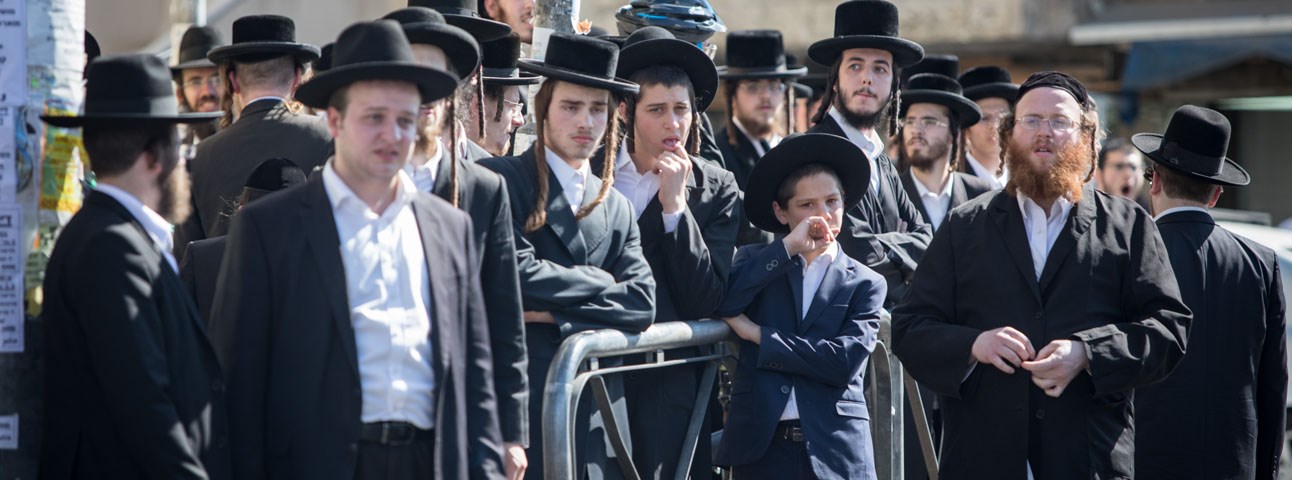
Israel’s Lost Youth: Manifest and Latent School Dropout
Written By: Dr. Asaf Malchi
The COVID-19 pandemic has significantly increased school dropout rates due to its exacerbation of the already emotional, social, and academic crises affecting multiple age and population groups.
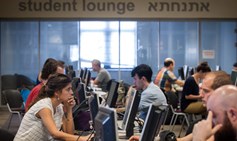
A Moment of Reckoning for the Education System
Written By: Dr. Tammy Hoffman
Israel is not adequately preparing its younger generation to be responsible citizens and must work now to improve its civics education curriculum.
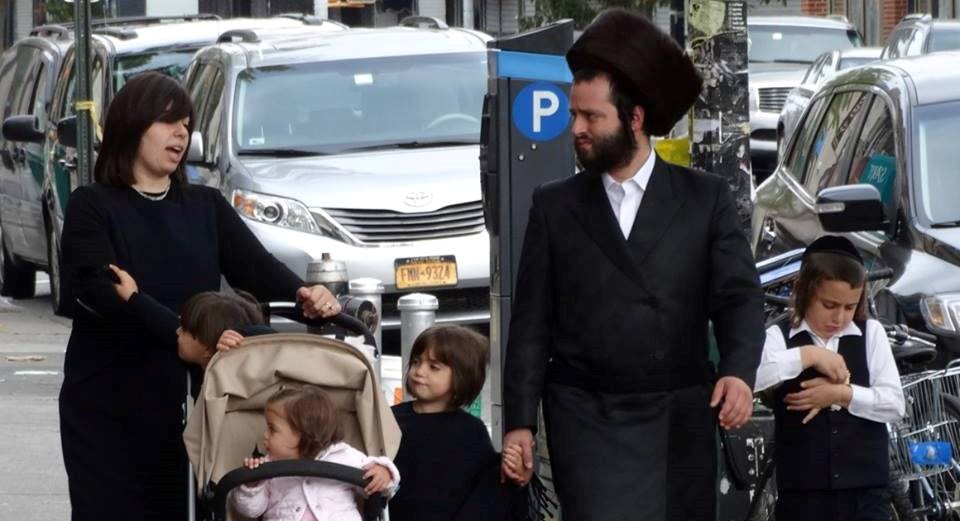
The Employment Revolution and the Haredim Who Are Being Left Behind
Written By: Dr. Asaf Malchi
With 50% of young Haredi men expected to enter the labor market actually those with poorer skills and abilities, there is an urgent need for an in-depth rethinking about Haredi education.
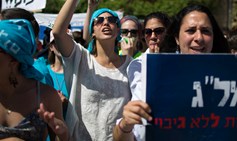
Proposed Ethics Code for Universities: IDI Leaders Respond to Minister Bennett and Members of the Council for Higher Education
‘Contrary to earlier reports, there is no similarity between the proposed code of ethics and the American code’

IDI Statement on Naftali Bennett's New Ethics Code
“Such an ethical code tramples freedom of expression with a heavy foot."

